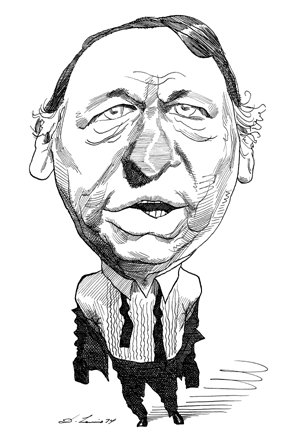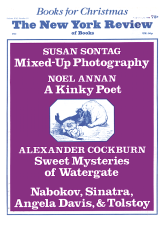Sinatra, who arrived on the scene at the end of one depression, seems to have triumphantly returned at the start of another. Caveat emptor, perhaps the sign at the Garden should have read. But a few Sundays ago on the night of “the main event” there was no apprehension that I could detect—and no WIN buttons either. Most of the fans seemed to me jubilant, middle-aged, affluent; many had probably risen with the star during the boom years of the war when they unexpectedly began making money “hand over fist”; then later, with the “Hit Parade” floating over the dashboard, moved onward to the ranch houses and mortgages of the suburbs. For them Sinatra was more than just a pop potentate, he was Old Faithful whose rill was purest and deepest because its treasured source was in the past.
Lessons of life and love, dues and debts, midnight gamblers at the wheel of fortune—the Sinatra repertoire was never exactly what one could call happy. But the bittersweet rhymes and insinuating rhythms, the tight light phrasing, the intimacy and ease of delivery—these became the perfect accompaniment for an increasingly mobile culture. Somehow as a performer Sinatra could genuinely suggest he’d been through the mill, knew what it meant to “track the hidden country of your smile,” “travel each and every highway,” the eternal drift of the American Romance.
From the start he was both the slum kid from Hoboken (“and proud of it”), following in the wake of La Guardia and DiMaggio, and the sunshine kid with the mournful melting voice, defeating the big band sound, deftly creating a haven of solicitude and concern between his listeners and his songs. He established a new genre and a new tribe, a peculiarly American phenomenon, “the throb-and-sob idols,” who though infuriating to so elegant an émigré as Humbert Humbert could always flutter his indigenous nymphet:
I still hear the nasal voices of those invisibles serenading her, people with names like Sammy and Jo and Eddy and Tony and Peggy and Guy and Patty and Rex, and sentimental song hits, all of them as similar to my ears as her various candies were to my palate.
The old routine of hanging on to notes longer or letting go of them sooner than was normally done was a bit of syncopation Sinatra copped from Billie Holiday and Mabel Mercer—though as a stylist he never equaled either. Nor was his voice ever so mellow or so vibrant an instrument as that of Bennett or Eckstine. Yet he learned to sing it salty or with bang-on theatricality or very fast and up, could range from the big bravura number like the soliloquy from Carousel to ditties like “The Coffee Song” or treacle like “This Love of Mine” or the soaring clarity and the gilded truisms, the glistening Nelson Riddle arrangements of the celebrated later albums, the pathos of “one last caress” before “it’s time to dress for fall.”
Of course for most of the young performers of today, as for their audiences, the guarantee of truth is in how loose you can hang, or stormy and direct you can be, how fast you turn on to yourself and your body. Sinatra, though, was never “liberated” enough for that. He belongs to a leaner, sterner, coarser era, where among what Tocqueville calls “the despotism of the majority,” failure and success were black and white, decisions and choices drastic, catch phrases and clichés—“all or nothing at all”—suggested divinatory promptings. For Sinatra, words mattered, the lyrics could never be garbled. Often the particular intensity of one of his moonlit reveries has less to do with “the blues” that “become my only song” than with its subliminal theme: the suspicion that the singer’s on to something his listeners know nothing about—or almost: the heady drama of winners and losers, the secrets of power.
In America, the Jews and the Italians have, for a number of years now, been largely dominant in their influence, either on politics and the arts or on show biz and sports. Certainly Sinatra as an Italian American was an early example. Far from thwarting his progress, as would have happened in previous eras, his ancestry, on the contrary, boosted it. For here was a talented “little guy,” with a fresh and invigorating flamboyance, grabbing at (and of course revitalizing) the American Dream, just at that moment when the Wasp hegemony, so long the incarnation of it, was waning. A turn of events which during the war years most Americans were prepared to accept as right and just. Sinatra may have had the sheer allure of the rebel but he was no revolutionary, so therefore could be, and was, both potent and soothing. Once, however, the “Frankie” craze (mash notes smeared with lipstick, stolen cuff links and snatched bow ties, essay contests in newspapers or schools) yielded to the surer and sturdier Sinatra career, the speculation that most success stories in America seem to invite became rampant.
Advertisement
Wispy Vallee, folksy Crosby, dulcet Como—these were retiring types, reticent about their private lives. With Sinatra, though, hot rumors were forever dogging his heels: rat packs on the Coast, crapsville at Vegas, millionaires at Palm Beach, goofy Mafia hoods in black hats who could run ice picks through your heart or set you on fire with gasoline—multiplying myths which undoubtedly were as much a product of his enemies as of his friends. Yet they merely strengthened the already prodigal charm, gave “depth” and “mystery” and “point” to the sudsy ballads (Sinatra was surely the first of the pop stars—at least among whites—to make schmaltz sound virile). Helped, too, when he scored later as a dramatic actor in Hollywood, interpreting drifters at odds with the world, sufferers who were also avengers: Maggio in From Here to Eternity, the junkie in The Man With the Golden Arm, the caustic assassin in Suddenly.
Beethoven among the aristocrats of Vienna was fond of saying, “My nobility is here—and here,” while pointing to his head and his heart. Sinatra, though just as jaunty, was a bit more democratic. He knew that what feted him had formed him, that whatever the magnetism there in himself the force that sustained it lay across the footlights in the fancies of others. Always a marvelously intuitive performer, he moved, despite the occasional sags or snags, easily from era to era, from those guerrilla hordes of female admirers hanging limply over the balcony at the Paramount during the days when their older brothers were fighting at Anzio or Guam (the earliest representatives of the youth movement of which he was surely the founder) to the freckled-faced earnestness of the era that followed, when white bucks were called fruit boots, Arthur Godfrey lecturing Julius La Rosa on “humility” was making headlines, Doris Day on the highest hill was shouting about her secret love, and the prevailing Fifties theme exercising the anxieties of adolescents in the suburbs was that of daring to “go all the way.” Girl: “If I let him go all the way, won’t he think I’m cheap?” (Boy: “Ah, you can go all the way with her, she’s a dog.”)
The Sixties and its convulsions, of course, were intermittently unsettling. Sinatra seemed to be growing aimlessly epicurean, pointlessly squandering himself at expensive resorts or in blowsy scandals, had few hits and some flops, could descend to dyspeptic commentary of a startlingly hoary nature. Rock, for him, was the “martial music of every sideburned delinquent.” Rock performers had no nuance, no texture, no grace. He began curiously to sound like some sort of English prof. But he had his Ava, his Mia, his golden oldies, was philanthropist and spendthrift, pugilist with the press, a Washington interloper (resisted by the Kennedys but tight with Agnew), survivor of Top Forty pressures, and it was not meant that he be memorialized as one more beached buccaneer. The wave of nostalgia would surely forbid it.
Up there on the small silvered stage at the Garden, the spindly swagger now a baronial strut, the roving blue eyes puffy but reading his audience as before, one hand casually at rest in the pocket of a fancy dinner jacket, the other gesturing or holding a mike, a truculent stamp of the foot to emphasize a point or a beat, he looked paunchy and a bit dippy perhaps. But bobbing his head to the nudniks in minks, the celebrities in boots and jeans, he was back performing with his familiar air of no apologies and no regrets, whether warbling a flimsy litany of “exotic lands” and “wishing wells,” “my poor old heart” and “my kind of town,” pausing to offer a prefatory note to the next hard luck ballad (“a fellow whose chick split, grabbed all the money and grass, left him with the grape”), or becoming cocky and ascerbic, delighting in autobiographical asides—about his father (“he wasn’t born here, rest his soul, but he made damn sure that I was”), about his enemies (“they’ll get theirs, boy”), about his “family,” the rapt faces beaming in the expensive seats (“I have never felt so much love in one room in my whole life”), and, of course, about himself (“a feather-weight when I began, but a couple years and a few pizzas later, you’re looking at the middleweight champ”).
His egoism was softened by his celebrity’s twinkle and his skeptic’s grin—but there was no doubt he meant business. As do we all. Poe saying he wanted incense to ascend in his honor from every hill and from every hamlet, from every city in the land—well, that’s the lofty babbling of the neglected artiste, his poor delirium only to be posthumously assuaged, if that. Sinatra was more mundane, the message simpler: individualism c’est moi. The gorgeous solitary and the pugnacious loner: the individualism Emerson hymned and Tocqueville deplored—these strains always met curiously and persistently in one of the most enduring acts around, shot voice and all.
Advertisement
You could hear a pin drop in the chilly confines of what he laconically called “the building” while he struggled to sustain the wavering melody of “Autumn in New York,” then slowly, sulkily gave up on that, began whispering the frail lyrics instead, finally delivering the tombal tones diminuendo into the mike, the last notes floating away like the last leaves off a tree.
A Porter medley. A few Paul Anka songs. Jim Morrison turning over in his grave. The performances, for the most part, were, I thought, excruciating, but they left the audience, as always, ecstatic. The daunting arrogance, along with the occasional celestial lull—these gave the evening both an aura of demagoguery and the bouncy charge of a revivalist’s meeting. Even the “misery in the land,” duly acknowledged, added the appropriate prayerful note. Then, “The Battle Hymn of the Republic” as distant counterpoint, Sinatra inspiritingly sang his salutations to “the church, the school, the clubhouse,” “the little corner news-stand,” “all races and religions,” ecumenical dazzle and drive. A balmy preliminary, however, to the concluding number, the rousing portrait of the fellow who “ate it up and spit it out,” who “grew tall through it all,” who did it “my way”—which he rightly called, again to the approbation of the audience, the “national anthem.”
And yet, hanging over the festivities, wasn’t there the presence of another fabled figure, a bit more pharisaical? He too had a “big mouth,” had been “kicked around,” he too “had the guts to fight it out,” with him too our destinies seemed irresistibly involved. The fallen leader with the bum leg, whose “favorite movies” were “those from the Fifties,” whose bequest has yet to be fathomed, and whose peripeteia perhaps the sudden reappearance of a mesmeric entertainer was meant to banish from our thoughts—at least for a night.
This Issue
November 28, 1974




